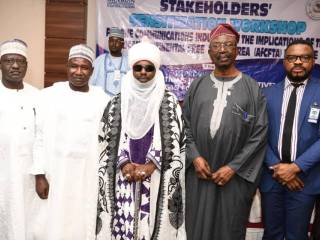The Commission's initiatives in this regard started yesterday (6/11/19) in Kano at a two-day industry sensitisation workshop which it organised in collaboration with the Nigerian Office for Trade Negotiation (NOTN). The event, taking place at Bristol Palace Hotel, is focused on "Improving Nigeria Telecoms Industry Competitiveness for AfCFTA".
Addressing stakeholders at the workshop, Chairman of NCC Board of Commissioners, Otunba Olabiyi Durojiaye, said the programme was organised in line with the Federal Government’s objective of ensuring that the sector continues to improve on its contribution to the Gross Domestic Product (GDP) and by extension the Nigerian economy.
“At NCC, we recognise that the Agreement means that we now have access to extend communications services to 1.2 billion people across the African continent. With a larger proportion of this population made up young people, whose hunger for data and mobile services continues to growth, there is no limit of achievement for innovative operators/investors in terms of business opportunity,” he said.
He assured that the Commission will continue to strive to improve the performance of the country's rapidly-evolving industry, by encouraging more investments in the industry, engaging stakeholders on issues of common interest, and charting viable courses for the growth and development of the industry/economy.
Similarly, Prof. Umar Danbatta, the Executive Vice Chairman (EVC) of NCC, noted that the Commission earnestly exploring how Nigeria can improve the competitiveness of its over $70 billion worth of telecoms market within the framework of AfCFTA.
Danbatta stated that by hosting the workshop NCC hoped to draw attention of industry stakeholders to the need to fully appreciate the business implications of AfCFTA and promote deep understanding of the AfCFTA initiative, as well as the institutions that will come into force following the activation of the Free Trade Area.
Other objectives of the workshop, according to the EVC, are to initiate and lead discussion on identifying areas of comparative advantage for the Nigerian telecoms stakeholders in addition to developing strategies for market entry and market exploitation for Nigeria-based telecom investors. Equally, NCC want encourage industry stakeholders on the need to seek and exploit opportunities that will emerge in the operational phase of the AfCTA. He also affirmed that the workshop also provides opportunity for capacity building for telecoms industry stakeholders on the AfCFTA initiative.
“We also hope to leverage the provisions of AfCFTA to the advantage of Nigeria’s telecoms industry, which remains one of the major factors to fully drive the digital economic revolution in the country” Danbatta stated.
AfCFTA is an initiative of the Africa Union which central objective is to create a single continental market for goods and services, in addition to facilitating free movement of investment and people across the entire African Continent.
Nigeria joined the list of African countries committed to this initiative when President Muhammadu Buhari signed the AfCFTA Agreement on July 7th, 2019 at the African Union Summit in Niamey, Republic of Niger.
The African Union (AU) reports that AfCFTA will create the world's largest free trade area. Implementing AfCFTA will also lead to about 60 percent boost in intra-African trade by 2022, considering the fact that only 16 percent of international trade by African countries take place between African countries.
The workshop is expected to come up with actionable recommendations and solutions that will guarantee positive growth, development and prosperity for Nigerian telecoms industry, the Nigerian economy, and the African continent.
The second workshop will take place in Lagos from 13th-14th November 2019.
